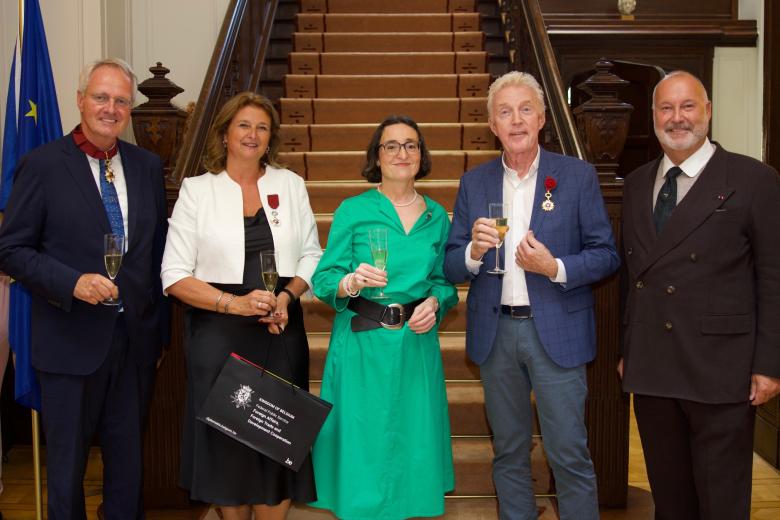Seeking elderly people with flabby muscles
People 70 and older who find that their muscle strength has deteriorated and for instance walk less than they would like to, are the target group of a new, large international study in which Maastricht University is participating. Professors Annemie and Jos Schols (indeed, brother and sister) are taking the reins for the Netherlands.
Elderly people suffering from a chronic illness regularly see health care providers in the Netherlands. “But there is also a group of elderly people who only come into contact with health care if they fall and break something”, says Jos Schols. “That's a sign of sarcopenia.” Annemie Schols adds, “We now know from many studies that if people become immobile or don’t move enough, that's a bad sign for their health in the future. This has multiple causes and you can’t address all of them, but the loss of muscle mass is a cause that you can address.”
Behavioural change
And that is exactly what the international Sprintt study, funded by the European Innovative Medicines Initiative (IMI), will try to show. Spread over eight European countries (The Netherlands, Germany, England, France, Spain, Italy, Czech Republic and Finland), 1500 elderly people will be included in a scientific study in which they will follow a particular intervention for two years. In the Netherlands, more specifically in Limburg, there will be more than 100 subjects, divided into two groups. One group will meet once a month together with other elderly people under the guidance of a team of experts to discuss and learn about a healthy lifestyle. In addition to this, the other group will also be given physical exercises and personalised nutrition advice. Jos Schols: “Actually, we want to train this group to walk two and a half hours spread throughout the week. That sounds simple, but everyone knows how difficult it is to achieve behavioural changes, even in healthy young people.”
Personalised nutrition
Annemie Schols: “Combined with personalised nutrition, something we already know a lot about in Maastricht, we expect that more exercise can stop or lessen muscle loss. I think the beauty of this project is that it involves an at-risk group which is frail but still lives independently, for whom you are trying to prevent deterioration through relatively simple interventions.” Her brother adds, “We used to think: ‘Frail elderly people in particular should be coddled—tender loving care— which would contribute as much as possible to happy aging.’ I think that, too, but it is mostly true for the last year of life in a nursing home. Nowadays, it's all about ‘healthy aging’, growing older healthfully. We want people to be active, to keep up cognitively, to participate in society. With this study, we want to try and keep people active and show that you can help them adopt another lifestyle.”
Keep moving
The message of the research team led by the Schols duo is: ‘Don’t accept the deterioration of your health; keep moving’. And they hope that this attitude will take root. Jos Schols: “It makes no sense, of course, if after two years the elderly sit around and waste away again. Therefore, two years are important.” His sister: “By following people for so long, the effects are greater. For this type of intervention, it’s crucial that we move to longer-term studies. We work with small groups because people usually find it nice to go through this kind of process together. But not everyone is a pack animal, so it can also be done individually. In any case, we organise it so it’s easily accessible for the elderly, to increase the likelihood that they keep it up. That is ultimately also an important research question for us: how do you ensure that people participate for two years? Because the intervention is effective when they do, of that we’re almost certain.” Jos Schols: “We also track how much and how often the subjects use health care services, so that we can also compare that later. If you can demonstrate that this kind of intervention will cost less than the care used by inactive elderly, in the future you might be able to insure personal counselling for active aging. “The expertise of the Schols professors (elderly care and chronic diseases) comes together perfectly in this long-term study of this target group. Annemie Schols: “In this project you need both disciplines, so I really like that we can come together to take the reins of a knowledgeable, multidisciplinary team of very committed staff.”
What is sarcopenia?
Sarcopenia is the loss of muscle mass which occurs gradually with age, faster for some elderly people than for others. The cause probably lies in irregularities in metabolism, for example due to unhealthy habits, diet, inactivity, smoking, sometimes in combination with a chronic illness. Sometimes the muscles are so weakened that it causes functional disabilities. It is a well-known phenomenon in the elderly, but with chronic diseases such as COPD, for example, it seems to occur more rapidly.
Who can participate?
People 70 and older who suspect that their muscle strength is declining or notice that they are not functioning as well physically and are not living in a nursing home, can contact the research team (via Coby van de Bool, tel. 043-3881324 or email coby.vandebool@maastrichtuniversity.nl). It is important that they are motivated to participate in the study for two years (attend a meeting in their area once a month, possibly exercise at home and come to the Maastricht hospital four times a year for measurements). After completing an intake by phone, they will be invited to Maastricht for an examination, during which their body composition (muscle, fat, bone density) will be measured. This will determine if they suffer from sarcopenia. Then they can be ‘included’ in the study.
Jos Schols
Prof. Jos Schols (1957) has been Professor of Geriatric Medicine at Maastricht University since 2007. He has also worked as the Director of Expertise for Envida, a health care organisation that works predominantly with the chronically ill and elderly in Maastricht-Heuvelland. He primarily researches common health care problems in nursing home patients, such as malnutrition, falls and bedsores, and also deals with the subject of frailty in the elderly and geriatric rehabilitation. In the past, he worked for more than fifteen years as a nursing home physician. His research is conducted under the umbrella of CAPHRI, the Maastricht School of Public Health and Primary Care.
Annemie Schols
Prof. Annemie Schols (1961) has been Professor of Nutrition and Metabolism in Chronic Diseases at UM since 2004. Since 2006, she has also been scientific director of NUTRIM, the Maastricht School of Nutrition and Translational Research in Metabolism. Her research focuses on lung diseases including COPD and lung cancer. In 2014, she was honoured for her research by the European Society for Clinical Nutrition and Metabolism, and in 2015 she received the first COPD GOLD medal from the European Respiratory Society (ERS), partly because she connects different disciplines and in this way actually improves the care for these patients.
Also read
-
Green light for UM participation in unique YUFE bachelor programme
The UM can start as a degree awarding partner in the new unique bachelor programme Urban Sustainability Studies offered by YUFE (Young Universities for the Future of Europe), an alliance of ten European universities. This week, the UM received a positive outcome of the macro due diligence assessment...

-
Professor Anouk Bollen-Vandenboorn appointed Knight in the Order of the Crown
Prof. Dr Anouk Bollen-Vandenboorn, Director of the Institute for Transnational and Euregional cross border cooperation and Mobility (ITEM) at the Faculty of Law, Maastricht University, was appointed Knight in the Order of the Crown on 3 July, during a formal ceremony at the Belgian Embassy in The...

-
Case note by MCEL members Fulvia Ristuccia and Alessandro Marcia published in Maastricht Journal of European and Comparative Law
The annotation published as online-first in the Maastricht Journal of European and Comparative Law, comments on the Grand Chamber's ruling in Mirin.
